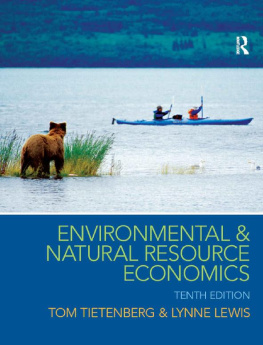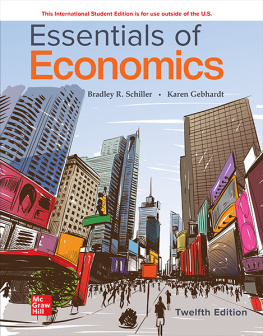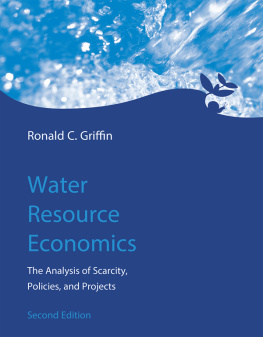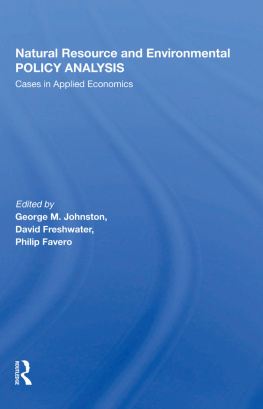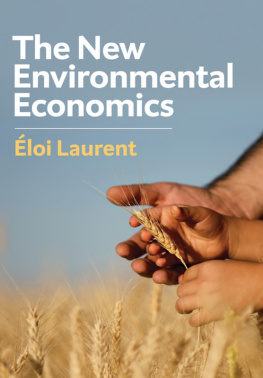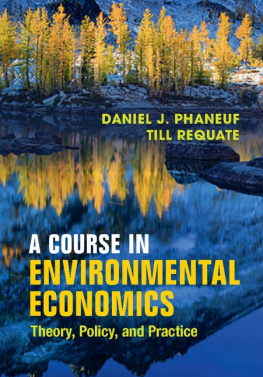Environmental & Natural Resource Economics
10th Edition
Environmental & Natural Resource Economics
10th Edition
Tom Tietenberg
Emeritus, Colby College
Lynne Lewis
Bates College

First published 2009 by Pearson Education, Inc.
Published 2016 by Routledge
2 Park Square, Milton Park, Abingdon, Oxon OX14 4RN
711 Third Avenue, New York, NY 10017, USA
Routledge is an imprint of the Taylor & Francis Group, an informa business
Copyright Taylor and Francis. All rights reserved. No part of this book may be reprinted or reproduced or utilised in any form or by any electronic, mechanical, or other means, now known or hereafter invented, including photocopying and recording, or in any information storage or retrieval system, without permission in writing from the publishers.
Notice:
Product or corporate names may be trademarks or registered trademarks, and are used only for identification and explanation without intent to infringe.
Library of Congress Cataloging-in-Publication Data
Tietenberg, Thomas H.
Environmental & natural resource economics / Tom Tietenberg, Emeritus, Colby College, Lynne Lewis, Bates College. 10th Edition.
pages cm
Includes index.
ISBN-13: 978-0-13-347969-0
ISBN-10: 0-13-347969-2
1. Environmental economics. 2. Environmental policy. 3. Natural resourcesGovernment policy. 4. Raw materialsGovernment policy. I. Lewis, Lynne. II. Title. HC79.E5T525 2014
333.7dc23
2013050399
Contents in Brief
Contents
A glance at any newspaper will confirm that environmental economics is now a major player in environmental policy. Concepts such as cap-and-trade, renewable portfolio standards, block pricing, renewable energy credits, development impact fees, conservation easements, carbon trading, the commons, congestion pricing, corporate average fuel economy standards, pay-as-you-throw, debt-for-nature swaps, extended producer responsibility, sprawl, leapfrogging, pollution havens, strategic petroleum reserves, payments for ecosystem services, and sustainable development have moved from the textbook to the legislative hearing room. As the large number of current examples in Environmental & Natural Resource Economics demonstrates, not only are ideas that were once restricted to academic discussions now part of the policy mix, but they are making a significant difference as well.
New to This Edition
New Features
New chapter on ecosystem services that covers the state of ecosystem services, valuing ecosystem services, and policy mechanisms to protect and maintain ecosystem services ()
Updated data on water pricing ()
New Self-Test Exercises ()
Many new economic studies discussed
New and updated tables and figures
New or Expanded Topics
Dealing with asymmetric information problems ()
Scale and aggregation issues in benefit-cost analysis ()
Compensating and equivalent variation approaches to valuation ()
)
Benefit transfer and meta-analysis ()
Innovative responses to valuation challenges ()
The economics of hydraulic fracturing (fracking) on energy supply ()
The impact of the Fukushima accident on the role of nuclear power ()
The relative costs of alternative fuels for electricity generation ()
Impact of fracking on water demand and local air and water quality ()
Recycling and fairness issues associated with e-waste ()
Water markets in Australia ()
Catch shares and territorial use rights fisheries ()
Special challenges and innovation in ecosystem valuation ()
Game theory as a window on climate negotiations ()
The environmental effectiveness and cost effectiveness of existing carbon pricing programs ()
The special role of natural gas in climate policy ()
Carbon pricing design issues: offsets, price volatility, and linking regional systems ()
Pricing public transport ()
The effectiveness of tax credits for electric vehicles ()
New Examples and Debates
Estimating the Benefits of Carbon Emissions Reductions: The Social Cost of Carbon
Using the Travel Cost Method to Estimate Recreational Value: Beaches in Minorca, Spain
Valuing the Reliability of Water Supplies: Coping Expenditures in Kathmandu Valley, Nepal
The Green Paradox
The Relative Cost-Effectiveness of Renewable Energy Policies in the U.S.
Energy Efficiency in Rental Housing Markets
Does Packaging Curbside Recycling with Incentives Promote Efficiency?
Moving Rivers or Desalting the Sea? Costly Remedies for Water Shortages
ITQs or TURFs? Species, Space, or Both?
The Value of Coral Reefs in the U.S. Virgin Islands
Costa Ricas Pago por Servicios Ambientales (PSA) Program
The Agglomeration Bonus
The Sulfur Allowance Program after 20 Years
Three Illustrative Carbon Pricing Programs
External Benefits of Fuel Economy Standards
Discounting over Long Time Horizons: Should Discount Rates Decline?
Willingness to Pay versus Willingness to Accept: Why So Different?
Distance Decay in Willingness to Pay: When and How Much Does Location Matter?
What Is the Value of a Polar Bear?
Does the Advent of Fracking Increase Net Benefits?
Paying for Ecosystem Services or Extortion?: The Case of Yasuni National Park
Tradable Quotas for Whales?
An Overview of the Book
Environmental & Natural Resource Economics attempts to bring those who are beginning the study of environmental and natural resource economics close to the frontiers of knowledge. Although the book is designed to be accessible to students who have completed a two-semester introductory course in economics or a one-semester introductory microeconomics course, it has been used successfully in several institutions in lower-level and upper-level undergraduate courses as well as lower-level graduate courses.
The structure and topical coverage of this book facilitates its use in a variety of contexts. For a survey course in environmental and natural resource economics, all chapters are appropriate, although many of us find that the book contains somewhat more material than can be adequately covered in a quarter or even a semester. This surplus material provides flexibility for the instructor to choose those topics that best fit his or her course design. A one-term course in natural resource economics could be based on .
In this tenth edition, we examine many of these newly popular market mechanisms within the context of both theory and practice. Environmental and natural resource economics is a rapidly growing and changing field as many environmental issues become global in nature. In this text, we tackle some of the complex issues that face our globe and explore problems and potential solutions.
This edition retains a strong policy orientation. Although a great deal of theory and empirical evidence is discussed, their inclusion is motivated by the desire to increase understanding of intriguing policy problems, and these aspects are discussed in the context of those problems. This explicit integration of research and policy within each chapter avoids a problem frequently encountered in applied economics textbooksthat is, in such texts the theory developed in earlier chapters is often only loosely connected to the rest of the book.
This is an economics book, but it goes beyond economics. Insights from the natural and physical sciences, literature, political science, and other disciplines are scattered liberally throughout the text. In some cases these references raise outstanding issues that economic analysis can help resolve, while in other cases they affect the structure of the economic analysis or provide a contrasting point of view. They play an important role in overcoming the tendency to accept the material uncritically at a superficial level by highlighting those characteristics that make the economics approach unique.
Next page
